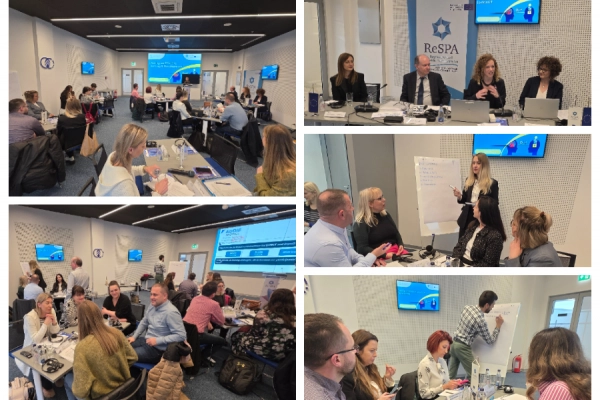
Training on Learning & Development Toward High-Quality, Impact-Driven Training Programs
25-26 March 2025, Podgorica, Montenegro
Strengthening learning and development capacities is critical for modernizing governance in the Western Balkans. Rapid technological advancements and evolving learning needs require public administration institutions to adopt modern, evidence-based training methodologies. During an extensive 2-day training programme, government officials and training professionals from the Western Balkans got acquainted with innovative methods for improving public sector training programmes. In particular, they learned about the state-of-the-art instructional tools and strategies to ensure more effective policymaking and service delivery.
Experts from the Belgian BOSA (Federal Public Service for Public Administration), Peter Vandenbruaene and Mélanie Recour, shared best practices in curriculum design, learning technologies, and evaluation methodologies, emphasizing that public administration training programs must be tailored, evidence-based, both engaging and impactful, and ensuring continuous quality improvement in public sector training initiatives.
On the first day, the training focused on adult learning methods. Experts introduced Andragogy as a foundation for designing effective training programs. Understanding how adults learn differently from younger students is essential for creating engaging content and achieving better learning outcomes.
The sessions then covered Global Curriculum Design, where participants examined multi-dimensional approaches to structuring training programs, ensuring they addressed individual and institutional needs. The Training Needs Analysis session guided participants in identifying knowledge gaps and aligning training objectives with public administration priorities.
Finally, participants explored course-related curriculum design, defining clear learning outcomes using SMART (Specific, Measurable, Achievable, Relevant, Time-bound) objectives. They also discussed integrating interactive tools such as flipped learning methodologies and digital learning platforms into training programs.
The second training day focused on consulting skills and storytelling. Experts explained how public sector trainers could enhance their communication techniques to engage learners more effectively, demonstrating how narrative techniques and real-life case studies could make complex topics more accessible.
A particularly relevant session covered digital and AI-powered learning tools, where trainers showcased the latest innovations in Learning Management Systems and Learning Experience Platforms. The discussion emphasized that AI-driven personalization and adaptive learning environments could significantly improve public administration training by tailoring content to individual needs.
The training concluded with a session on training evaluation methodologies, where experts highlighted the importance of continuous assessment and feedback loops to ensure that learning programs remain practical and relevant. They stressed that public sector training programs risk stagnation and inefficiency without proper evaluation mechanisms.
Jelena Mrdak, ReSPA Programme Manager, noted that “This training is not just another learning opportunity—it is a carefully curated program designed to strengthen the capabilities of training managers in the public sector. Participants explored innovative methodologies like flipped learning, storytelling, and consulting techniques to enhance engagement and ensure continuous improvement in training effectiveness. In an era of rapid technological advancements and evolving learner expectations, it is essential that we equip ourselves with the knowledge and tools needed to foster meaningful and impactful training programs.”
As governments in the region continue their public administration reforms, the insights gained from this training could contribute to developing high-quality, impact-driven training programs, ensuring a more skilled and capable workforce in the public sector.



